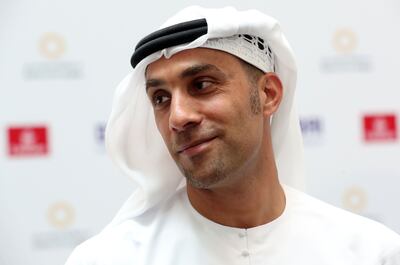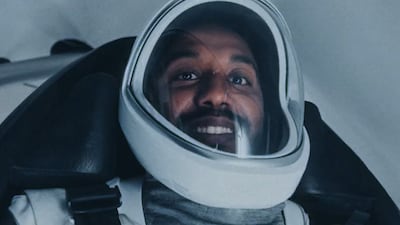The Arab world is primed to celebrate a landmark achievement that will highlight its soaring progress ― on this planet and beyond.
In a few short weeks, three Arab astronauts will meet on board the International Space Station.
On February 26, the UAE's Sultan Al Neyadi will blast off into the skies for a six-month mission on the orbiting science laboratory.
He is scheduled to be joined in the spring by Saudi Arabia's Rayyannah Barnawi, will become the first female Arab in space, and her compatriot Ali Al Qarni, who will be spending a 10-day stint on the ISS.
The UAE's Hazza Al Mansouri in 2019 was the first and so far only Arab to spend time on the station.
Before the ISS existed, Prince Sultan bin Salman of Saudi Arabia flew on Nasa's Space Shuttle in 1985, becoming the first Arab in space.
The milestone moment to come demonstrates a giant leap forward in the space race by both nations. But it is not the only cause for celebration.
Saudi Arabia sending its first female to space, less than five years after the kingdom lifted its ban on women driving, is notable for its show of societal growth.
The UAE selected the Arab world's first woman astronaut, Nora Al Matrooshi, in 2021. She said it allowed her to fulfil a childhood dream.
Region marks stellar success
Salem Al Marri, director general of the Mohammed bin Rashid Space Centre, told The National that the Arab assembly will be an exciting moment.
“The space station has received one Arab astronaut in about 22 years of operation," he said.
“So if now, in one year, we’re able to have three Arab astronauts there at the same time, I think that’s pretty cool.
“I think it really showcases that this region is starting to look at space as something important and a driver of whether it is the economy, supporting education or doing outreach.”

The station became operational in 2000 and is a joint project by Nasa, Russia's space agency Roscosmos, the European Space Agency, Japan's Jaxa and the Canadian space agency.
Maj Al Mansouri flew on Russia's Soyuz rocket in 2019 as part of a long-term astronaut programme launched by the Emirates.
Saudi Arabia launched their astronaut programme last year, with four citizens currently making up its astronaut corps.
Teaming up with Saudi Arabia
Mr Al Marri said collaborating with the kingdom in space is something they have in mind.
"First of all, Saudi Arabia is a brotherly and a close nation. We are working with them closely on many different areas," he said.
"And this is something that we are looking at closely ― how could we work together with Saudi. There are some ideas and we'll see where it goes."
The menus for the UAE astronaut has not been revealed yet, although Maj Al Mansouri took traditional Emirati dishes during his trip.
Usually, American astronauts and their colleagues on board the station share meals on special occasions, such as Thanksgiving, the Fourth of July, and birthdays.
It could be that the three Arab astronauts have their own food party on the ISS to celebrate and share their cultures.

On Earth, the UAE and Saudi Arabia are part of the Arab Space Co-operation Group ― an organisation made up of several member states from the Middle East and North Africa region that exchange experiences.
This helps smaller Arab nations learn more from countries like the UAE and Saudi Arabia, who are investing heavily in their space programmes.
Bahrain, for example, launched its first nanosatellite, Light-1, in 2021 after teaming up with a UAE university.
Kuwait launched its KuwaitSat-1 nanosatellite in January.
And Oman also built its first satellite, which was destroyed last year after a Virgin Orbit launch failure.
But the sultanate has announced plans to build the Middle East's first spaceport.
Who are Saudi Arabia's new astronauts?
Saudi Arabia named their astronauts last week, months after announcing that they had secured a trip to the ISS.
Ms Barnawi, 33, is a research laboratory specialist, with nine years of experience in cancer stem cell research. She has a master's degree in biomedical science from Alfaisal University.
Mr Al Qarni, 31, is an air force captain with 2,387 flying hours logged. He has 12 years of experience on fighter aircraft. He has a bachelor's degree in aeronautical sciences from the King Faisal Air Academy.
Ali Alghamdi, 31, and Mariam Fardous, 38 are the back-up astronauts for this mission.
Ms Fardous is an epidemiology physician with 13 years' experience. She has a master's degree in epidemiology from the King Saud bin Abdulaziz University for Health Sciences.
Mr Alghamdi is an air force captain with 11 years' experience on fighter aircraft, and 2,285 flying hours logged. He has a bachelor's degree in aeronautical sciences from the King Faisal Air Academy.
Private US space industry making missions possible
Axiom Space, a space infrastructure company in Houston, has made both the UAE and Saudi missions possible.
The UAE signed a deal with the company last year.
This is the Falcon 9 seat that Axiom Space got in exchange from Nasa, after the company gave up its Russian Soyuz rocket seat for American astronaut, Mark Vande Hei, in 2021.
MBRSC did not disclose how much they paid Axiom for the seat, but the agreement includes transportation to and from the space station; comprehensive mission support; all necessary training and preparation for launch; flight operations; and landing and crew rescue services.
Saudi Arabia signed a deal with the company last year. The agreement involves two Saudi astronauts who will be part of the Ax-2 mission, a privately-led mission by Axiom Space.






